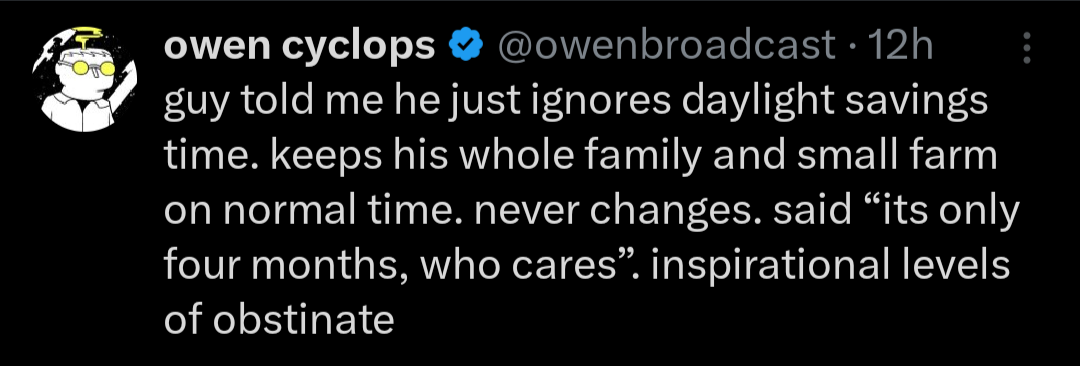this post was submitted on 07 Oct 2024
1141 points (99.4% liked)
People Twitter
5905 readers
778 users here now
People tweeting stuff. We allow tweets from anyone.
RULES:
- Mark NSFW content.
- No doxxing people.
- Must be a pic of the tweet or similar. No direct links to the tweet.
- No bullying or international politcs
- Be excellent to each other.
- Provide an archived link to the tweet (or similar) being shown if it's a major figure or a politician.
founded 2 years ago
MODERATORS
you are viewing a single comment's thread
view the rest of the comments
view the rest of the comments

Even for sleep schedules 90% is a stretch between early risers an night owls and people who work unusual shifts and people who don't work so they get up later and people who have insomnia so they might be up at unusual times,...
However why do you people focus so much on sleep schedules when 99% of the time you want to know when someone is available for some shared activity or want to tell them when an activity is happening so they can judge if they can make it to that?
Sleep schedules are not a common topic of discussion except for statements like "I have to go to sleep soon/now" and "I just got up" when talking to people who are far away and relative terms like "soon"/"now"/... would keep working the same way anyway.
Usually that's set during daytime during what we'd call the workday. Which is usually the time between morning and evening, something that sun/daylight often sets. Something that time zones help to figure out instinctively...
See where this is going?
Yeah, I can definitely see that you have very little experience actually communicating with people in different time zones and on different work schedules.
Solid argument, friend
I mean your argument boils down to "I make this chain of assumptions and the result is extremely useful" when in reality none of those assumptions hold nearly often enough to get to the end of that chain with enough probability left to rely on it. If you had actually communicated with people internationally you would know that.
I did make the assumption that most stuff happens and most of the world revolves around daytime, which as far as I know, is very much true. Business hours, work day, most activities, most societal happenings are during that time between morning and night and in a vague sense globally shared. So naturally it makes sense to schedule the day around that and since that general rule holds true from country to country, it does make life easier to have time zones and be able to share that understanding of time of day. You are mentioning people or situations where they don't adhere to that general rule and as far as I understood it are using that as an argument to have a different system. But I'm not sure what sense it makes to change a system that works for most to a system that would benefit... not sure even who.
You correctly boiled the argument down but somehow you either disagree about how societies pretty much everywhere work or think that those exceptions you brought up are enough to change the system that works for most. And that just doesn't make very much sense, sorry to say. Maybe there's some vampire world hypothesis behind your reasoning and there's actually 4 billion people in vampire countries where it's flipped and it's the night when it's business hours, typical work hours and whatnot. In which case, I'm intrigued and definitely want to hear more. Because doing stuff during the day and sleeping during the night is sorta the norm for us non-vampire humans. We are what scientists and I call "diurnal".